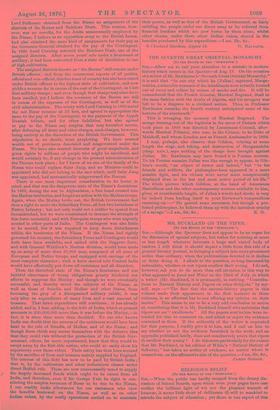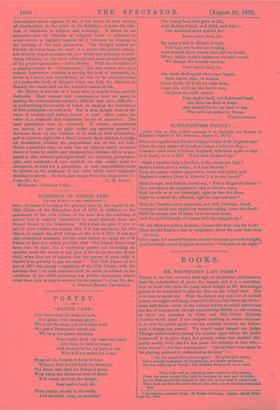RELIGIOUS BELIEF.
[TO Tan Elms OF THE " spsoTAToa..] Sin,—When the public has hardly escaped from the dreary dis- cussion of School Boards, upon which even your pages have cast neither the brilliant light of wit nor the pleasant warmth of humour, it seems little short of deliberate ill-will to mankind to, intrude the subject of education ; yet there is one aspect of this
trita subject which appears to me, if not novel, at least worthy of consideration in the quiet of the holidays,—I mean the rela- tion of education to religion and sociology. It seems to me axiomatic that no criticism of religious belief or political or social reform is logically tenable till it indicates its bearing on the training of the next generation. This thought strikes me forcibly on rising from the work of a writer who pneter-calmly, sub-silently, super-persuasively, but subtly and potently, is exer- cising influence on the moat advanced and most earnest thought of the present generation,—John Morley. With the exception of a passing remark in "Compromise," this able writer, who by a refined destructive criticism is solving the faith of thousands, is, so far as I know, not contributing an iota to the reconstruction of a systematic body of thought which can help the educator in floating the tiniest skiff on the troubled waters of life.
Mr. Morley is but one of a band who, in angelic form, trouble Bethesda. Their earnest and conscientious lives are spent in making the conscientious teacher's difficult task more difficult— in undermining the security of belief, in sapping the foundation of first principles—et voila tout. But is this, though done in the name of honesty and justice, honest or just? Here comes the value of a reasoned and reasonable theory of education. The next generation must be educated. If certain propositions are untrue, we have no right under any specious pretext to inculcate them on our children or to wink at their inculcation, and we have no right (for a time) to leave those children to judge for themselves whether the propositions are or are not true. Hance a practical rule,—a man has no right to attack accepted views of truth by subtle and irresponsible criticism till he is pre- pared to offer counter-principles which are coherent, pronounce- able, and verifiable—if not verified—or else reason must be abnegated, at least for a generation, or that responsibility must be thrown on the weakness of the child which adult judgment 'declines to accept. Is there any escape from this disjunction ?- I
Withernden, Caterham Valley.



































 Previous page
Previous page